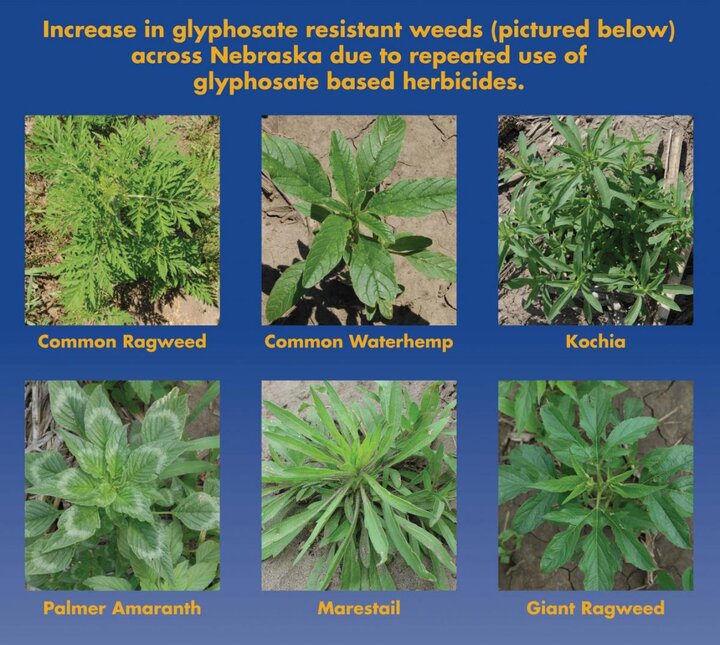Jan. 26, 2016
Pest resistance to pesticides (herbicides, fungicides, and insecticides) is not new, but is becoming a critical aspect of managing weeds, diseases, and insects in crop production. Pest resistance is also contributing to increased costs of production in some areas.
Nebraska Extension will be hosting four Pest Resistance Workshops this spring to educate farmers and ag advisors on the importance of herbicide, insecticide and fungicide resistance management, mode of action, and how to use this information to reduce the potential for resistant weeds, insects, and plant pathogens in Nebraska.
Status of Resistance
Pest resistance to any pest management tool, tactic, or strategy (chemical or nonchemical) has been documented for many years.
Weeds. In the mid-1950s, weed scientists predicted that repeated use of any herbicide could lead to shifts in weed species composition within a weed community and that herbicide tolerance in weeds can quickly increase with repeated use of the same herbicide. Soon after that, in the early 1970s, the first cases of weed resistance were documented in pigweed species showing resistance to atrazine.
Worldwide about 368 weed biotypes are reported to be resistant to 19 herbicide modes of action. For example, 40 dicot and 15 monocot species are known to have biotypes resistant to triazine herbicides. At least 50 weed species have been reported to have biotypes resistant to one or more herbicide families (www.weedscience.com). Repeated use of the same herbicide has always been the main reason for weed resistance to herbicides.

Insects have shown a similar pattern in developing resistance to many types of insecticides used to control crop pests. Insecticide resistance is a global issue for a wide variety of agriculturally important pests and has been reported in over 540 insect and mite species (www.pesticideresistance.com).
Nebraska has had a long history with insecticide-resistant pests. The western corn rootworm has been particularly difficult and has developed resistance to numerous insecticides for both larval and adult controls. In addition, corn rootworms in parts of Nebraska and the Midwest have developed resistance to some of the Bt proteins found in genetically modified corn, leaving growers with fewer control options and greater management costs. In the United States alone, crop losses due to pesticide resistance are estimated at $1.4 billion annually.
Plant Diseases. Plant pathogens have not developed significant resistance to fungicides for the most common diseases in field crops; however, there are some and the increased use of fungicides may lead to more resistance issues.
Currently, frogeye leaf spot of soybean and fusarium head blight of wheat are the only diseases known to have fungicide resistance in the U.S. corn, soybean and wheat crops. Neither has been identified in Nebraska yet.
Among specialty crops grown in Nebraska, there is fungicide resistance in ascochyta blight of chickpeas. Fungicides are still a primary means of controlling plant diseases and many companies are developing products with multiple modes of action to provide more durable products and manage resistance development.
Stevan KnezevicExtension Weed Management Specialist
Your field's worst nightmare. This short time lapse video demonstrates the unyielding nature of glyphosate-resistant marestail over a 28-day period following a 32 oz glyphosate treatment. (Source: Stevan Knezevic)
Pest Resistance Workshops
Nebraska Extension Pest Resistance Workshops will be held from 9:30 a.m. to 2:30 p.m. at
- Wayne, March 7 — Wayne Fire Hall; Host Extension Educator Keith Jarvi;
- Clay Center, March 8 — Clay County Fairgrounds; Host Extension Educator Jennifer Rees;
- Grant, March 10 — UNL’s Stumpf International Wheat Center; Host Extension Educator Strahinja Stepanovic;
- Scottsbluff, March 11 — UNL’s Panhandle Research & Extension Center, Bluestem Room; Host Extension Educator Gary Stone.
These 5-hour workshops include presentations on:
- insect resistance,
- disease resistance,
- herbicide-tolerant crops,
- herbicide mode of action and site of action groupings,
- how weed resistance develops, and
- weed resistance in the Midwest and Nebraska.
Attendees will also have a chance to conduct a hands-on exercise on controlling major multiple resistant weed species.
Workshop speakers are members of the UNL weed science, entomology and plant pathology teams, including: Stevan Knezevic (lead), Amit Jhala, Cody Creech, Nevin Lawrence, Chris Proctor, Keith Jarvi, Robert Wright, Julie Peterson, Jeff Bradshaw, Tamra Jackson-Ziems, Anthony Adesemoye, Sarah Schlund, and Robert Harveson.
Preregistration
Online preregistration is required for these workshops and is available at http://agronomy.unl.edu/pest-resistance. Cost is $50, which includes all materials. Seven CEUs have been approved for this workshop.
For more information contact the host educator listed in the schedule, program lead Stevan Knezevic, or Wendy Winstead. Cancellations must be made at least one week prior to the registered session to get a refund of all but a $10 processing fee.
